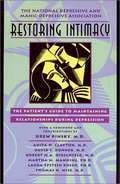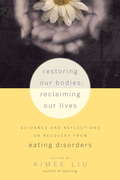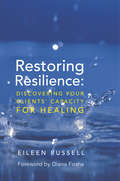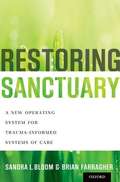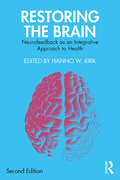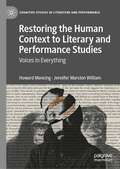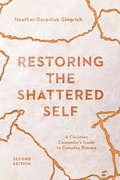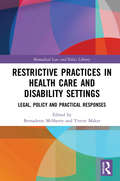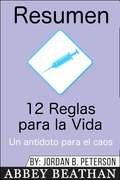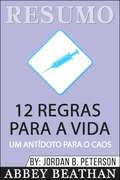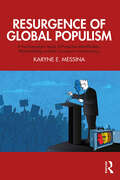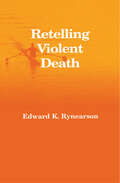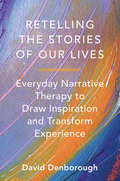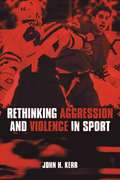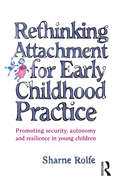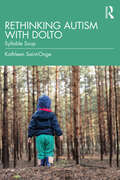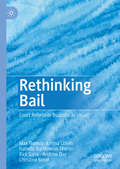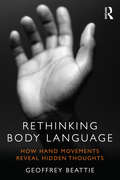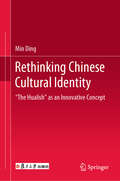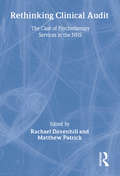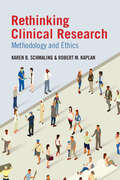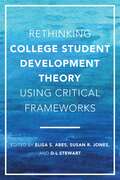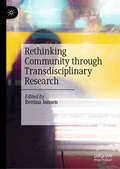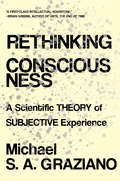- Table View
- List View
Restoring Intimacy: The Patient's Guide to Maintaining Relationships during Depression
by National Depressive And Manic-Depressive AssociationThe strongest of personal relationships are tested by depression. Depression leaves partners, friends, and loved ones with many questions, and few comfortable places to turn for answers.
Restoring Our Bodies, Reclaiming Our Lives: Guidance and Reflections on Recovery from Eating Disorders
by Aimee Liu Judith D. BankerFull recovery from an eating disorder is possible. Despite what you may have been led to believe, most people with anorexia, bulimia, or binge eating disorder are able to completely restore their health and well-being. But how does this happen? Author Aimee Liu has woven together dozens of first-person accounts of recovery to create a break-through roadmap for healing from an eating disorder. Restoring Our Bodies, Reclaiming Our Lives answers key questions including: How does healing begin? What does it feel like? What supports and accelerates it? Will I ever be free of worry about a relapse? Throughout the book are informative sidebars written by leading professionals in the field, addressing essential topics such as finding the right therapist, the use of medications, exploring complementary treatments, and how family members can help. Learn more at the author's website: www.aimeeliu.net.
Restoring Resilience: Discovering Your Clients' Capacity for Healing
by Daniel A. Hughes Eileen Russell Diana FoshaCultivating what is right, rather than focusing on what is wrong, for therapy that works. People enter therapy not just because they are stuck and struggling, but also because they are ready for change and have some hope of experiencing it. That readiness is a manifestation of each person's innate resilience, their capacity to work on their own behalf to heal. Many of the common modes of clinical work focus on pathology, the effects of habits or conditions that can be healed through clinical work. Eileen Russell, without discounting the importance of pathology, offers us the idea that the best way to help with what's going wrong in people's lives is to build from the foundation of what's going right. In this book, therapists will learn how to identify the potential for resilience in clients and help them cultivate and deepen it for lasting change. Drawing on interpersonal neurobiology and affect regulation research, as well as a number of theoretical orientations including Accelerated Experiential Dynamic Psychotherapy, Focusing, attachment theory, and EMDR, Russell provides the essential tools and background for any therapist interested in engaging in resilience-oriented therapy. She includes a wealth of thoughtfully annotated examples from her own clinical work, shares inspiring, illuminating stories of patients who have become more resilient through therapy, and offers many practical tips for clinicians along the way.
Restoring Sanctuary: A New Operating System for Trauma-Informed Systems of Care
by Sandra L. Bloom Brian FarragherThis is the third in a trilogy of books that chronicle the revolutionary changes in our mental health and human service delivery systems that have conspired to disempower staff and hinder client recovery. Creating Sanctuary documented the evolution of The Sanctuary Model therapeutic approach as an antidote to the personal and social trauma that clients bring to child welfare agencies, psychiatric hospitals, and residential facilities. Destroying Sanctuary details the destructive role of organizational trauma in the nation's systems of care. Restoring Sanctuary is a user-friendly manual for organizational change that addresses the deep roots of toxic stress and illustrates how to transform a dysfunctional human service system into a safe, secure, trauma-informed environment.
Restoring the Brain: Neurofeedback as an Integrative Approach to Health
by Hanno W. KirkThis thoroughly updated second edition of Restoring the Brain is the definitive book on the theory and the practice of Infra-Low Frequency brain training. It provides a comprehensive look at the process of neurofeedback within the emerging field of neuromodulation and essential knowledge of functional neuroanatomy and neural dynamics to successfully restore brain function. Integrating the latest research, this thoroughly revised edition focuses on current innovations in mechanisms-based training that are scalable and can be deployed at any stage of human development. Included in this edition are new chapters on clinical data and case studies for new applications; using neurofeedback for early childhood developmental disorders; integrating neurofeedback with psychotherapy; the impact of low-frequency neurofeedback on depression; the issue of trauma from war or abuse; and physical damage to the brain. Practitioners and researchers in psychiatry, medicine, and behavioral health will gain a wealth of knowledge and tools for effectively using neurofeedback to recover and enhance the functional competence of the brain.
Restoring the Human Context to Literary and Performance Studies: Voices in Everything (Cognitive Studies in Literature and Performance)
by Howard Mancing Jennifer Marston WilliamRestoring the Human Context to Literary and Performance Studies argues that much of contemporary literary theory is still predicated, at least implicitly, on outdated linguistic and psychological models such as post-structuralism, psychoanalysis, and behaviorism, which significantly contradict current dominant scientific views. By contrast, this monograph promotes an alternative paradigm for literary studies, namely Contextualism, and in so doing highlights the similarities and differences among the sometimes-conflicting contemporary cognitive approaches to literature and performance, arguing not in favor of one over the other but for Contextualism as their common ground.
Restoring the Shattered Self: A Christian Counselor's Guide to Complex Trauma (Christian Association for Psychological Studies Books)
by Heather Davediuk GingrichNearly every professional counselor will encounter clients with a history of complex trauma.Restoring the Shattered SelfDSM-5
Restos de historias
by Jorge BaficoLa columna de Bafico en Abrepalabra (Océano FM) se ha transformando enun ámbito para mostrar cuestiones de lo cotidiano (libros, películas,series, hechos de la realidad) con una mirada psicoanalítica y con unimportante componente: la música. Este libro está lleno de restos que sedesprenden de esas historias. Jorge Bafico es psicoanalista, pero también es comunicador. Escribe yhabla muy bien. Me agrada encontrarme con un columnista queprepara cada uno de los conceptos que comparte con la audiencia. Tendríaque ser moneda corriente, pero no lo es.Jorge elabora cada columna como si fuese un periodista o escritor quetiene que crear una historia con un buen comienzo, un desarrollo y unfinal.Me atrapó su mirada sobre la sociedad. Compartimos la escucha atenta yprofunda, la observación y la pregunta. Y, podría agregar, una granpasión por la lectura y la música.Durante mis años de profesión aprendí que la brevedad es una buenaconsejera en un mundo desbordado de mensajes y con fatiga crónica paradigerirlos. Eso sí, si se quiere profundizar se necesita tiempo delectura. Y esta es justamente mi invitación: tomarse un tiempo paradisfrutar de relatos que nos hacen repensar historias ajenas ?películas,series, libros, canciones?, pero que también, y sobre todo, nos haceninterrogarnos sobre nuestras propias historias.Gustavo Rey(Comunicador, conductor del programa Abrepalabra de Océano FM)
Restrictive Practices in Health Care and Disability Settings: Legal, Policy and Practical Responses (Biomedical Law and Ethics Library)
by Bernadette McSherryThis volume explores different models of regulating the use of restrictive practices in health care and disability settings. The authors examine the legislation, policies, inspection, enforcement and accreditation of the use of practices such as physical, mechanical and chemical restraint. They also explore the importance of factors such as organisational culture and staff training to the effective implementation of regulatory regimes. In doing so, the collection provides a solid evidence base for both the development and implementation of effective approaches to restrictive practices that focus on their reduction and, ultimately, their elimination across health care sectors. Divided into five parts, the volume covers new ground in multiple respects. First, it addresses the use of restrictive practices across mental health, disability and aged care settings, creating opportunities for new insights and interdisciplinary conversations across traditionally siloed sectors. Second, it includes contributions from research academics, clinicians, regulators and mental health consumers, offering a rich and comprehensive picture of existing regulatory regimes and options for designing and implementing regulatory approaches that address the failings of current systems. Finally, it incorporates comparative perspectives from Australia, New Zealand, the Netherlands, Germany and England. The book is an invaluable resource for regulators, policymakers, lawyers, clinicians, consumer advocates and academics grappling with the use and regulation of restrictive practices in mental health, disability and aged care contexts.
Resumen: Un antídoto para el caos
by Abbey Beathan12 reglas para la vida: un antídoto contra el caos por Jordan B. Peterson | Resumen del libro | Abbey Beathan (Descargo de responsabilidad: Este no es el libro original. Si estás buscando el libro original, busca en este enlace: http://amzn.to/2EGDhX4) Sé testigo de cómo este reconocido psicólogo responde las preguntas más difíciles y te ilumina en el proceso. En 12 Reglas para la Vida, Jordan B. Peterson con su tono humorístico condensa la sabiduría del mundo en 12 reglas prácticas para la vida. A través de preguntas interesantes, Peterson te enseñará 12 reglas para vivir que te harán un ser humano más feliz. Leer el libro se siente como si un tipo amigable te aconsejara, pero es mucho más que eso. 12 Reglas para la Vida te da consejos sobre cómo ser más feliz al implementar el conocimiento de los estudios de biología, literatura y religión. (Nota: este resumen está escrito y publicado por Abbey Beathan en su totalidad. No está relacionado de ninguna manera con el autor original )
Resumo: Um Antídoto Para o Caos
by Abbey Beathan Natália WerneckTestemunhe este psicólogo renomado reponder as questões mais difíceis e te iluminar no processo. Em 12 Regras Para A Vida, Jordan B. Peterson com seu tom humorístico condensa a sabedoria do mundo em 12 regras práticas para a vida. Através de perguntas interessantes, Peterson te ensinará 12 regras para viver que te farão uma pessoa mais feliz. Ler o livro é como uma pessoa amigável te dando conselhos mas é muito mais do que isso. É implementar conhecimentos sobre biologia, psicologia e religião. (Nota: Este resumo é totalmente escrito e publicado por Abbey Beathan. Não é afiliado com o autor original de nenhuma maneira) “It took untold generations to get you where you are. A little gratitude might be in order. If you’re going to insist on bending the world to your way, you better have your reasons.” – Jordan B. Peterson Por que você deveria sempre fazer carinho em um gato quando o ver na rua? Porque você não deeveria incomodar crianças quando estão andando de skate? Por que você sempre deve presumir que a pessoa com quem está falando deve saber algo que você não sabe? Acredite ou não, através destas perguntas estranhas, Peterson te fará se dar conta que o que é realmente imporante e te mostra os principios dele para viver uma vida melhor. Peterson educa seu público através das questões mais estranhas e a parte louca, é que realmente faz sentido quando você lê o livro. P.S. 12 Regras paara a vida é um livro extremamente interessante feito para te educar através de uma maneira não convencional porém divertida de aprender. P.P.S. Foi Albert Einstein que disse que uma vez que você para de aprender, você começa morrer. Foi Bill Gates que disse que ele gostaria de ter a habilidade de ler mais rápido se ele pudesse ter apenas um super poder neste mundo. A missão de Abbey Beathan é trazer as informações maravilhosas contidas em livros excelentes através
Resurgence of Global Populism: A Psychoanalytic Study of Projective Identification, Blame-Shifting and the Corruption of Democracy
by Karyne E. MessinaResurgence of Global Populism provides a psychoanalytic perspective to the global implications of the populist movement in the U.S. and its relationship to other parts of the world, particularly focusing on the presidency and legacy of Donald Trump. The book explores Trump’s use of psychological form of manipulation known as projective identification and how his use of this defense mechanism has influenced global institutions, political discourse, and quality of life in the long term. Messina explores the correlation between Trump’s rhetoric and an increase in reported racism and prejudiced violence worldwide, disintegration of global values, and a radicalized political climate. She analyzes the dynamics between Trump and his supporters, political opponents, and successors, considers the COVID-19 pandemic as a study of Trump’s views of the world, and considers the roles of social and television media. The book concludes with an explanation of antidotes to projective identification, including thoughtful debate and meaningful discussions and scripted dialogues for global healing. This insightful book will be of interest to psychoanalysts and psychotherapists, academics and students of political psychology and political movements, and readers interested in a deeper analysis of populism and political dynamics.
Retelling Violent Death
by Edward RynearsonThis book provides insight and instruction for bereaved readers and those who work with them.
Retelling the Stories of Our Lives: Everyday Narrative Therapy to Draw Inspiration and Transform Experience
by David DenboroughPowerful ideas from narrative therapy can teach us how to create new life stories and promote change. Our lives and their pathways are not fixed in stone; instead they are shaped by story. The ways in which we understand and share the stories of our lives therefore make all the difference. If we tell stories that emphasize only desolation, then we become weaker. If we tell our stories in ways that make us stronger, we can soothe our losses and ease our sorrows. Learning how to re-envision the stories we tell about ourselves can make an enormous difference in the ways we live our lives. Drawing on wisdoms from the field of narrative therapy, this book is designed to help people rewrite and retell the stories of their lives. The book invites readers to take a new look at their own stories and to find significance in events often neglected, to find sparkling actions that are often discounted, and to find solutions to problems and predicaments in unexpected places. Readers are introduced to key ideas of narrative practice like the externalizing problems - 'the person is not the problem, the problem is the problem' -and the concept of "re-membering" one's life. Easy-to-understand examples and exercises demonstrate how these ideas have helped many people overcome intense hardship and will help readers make these techniques their own. The book also outlines practical strategies for reclaiming and celebrating one's experience in the face of specific challenges such as trauma, abuse, personal failure, grief, and aging. Filled with relatable examples, useful exercises, and informative illustrations, Retelling the Stories of Our Lives leads readers on a path to reclaim their past and re-envision their future.
Rethinking Aggression and Violence in Sport
by John H. KerrRethinking Aggression and Violence in Sport explores the psychological aspects of these two intrinsic elements of competitive sport. This book critically examines the important issues associated with aggression and violence in sport, including: * a review of current theory in the psychology of aggression * exploration of how players become acclimatised to physical violence* discussion of the psychological benefits of sanctioned and unsanctioned sport violence* examination of the moral and ethical dimensions of the debate* the psychological basis of spectator aggression* case studies from a wide variety of sports. This text is a must read for researchers and students within sport studies, psychology and sociology with an interest in human violence and aggressive behaviour.
Rethinking Attachment for Early Childhood Practice: Promoting security, autonomy and resilience in young children
by Sharne A RolfeSharne Rolfe brings an excellent discussion of attachment principles, research and applications to an exceedingly important topic, the relationships between child care teachers/providers and young children. It is a important resource for the current and next generation of early childhood professionals and researchers, and it will be a key resource for the growing international discussion about child care teacher/provider and child relationships.' Helen H. Raikes, PhD, The Gallup Organization, and Society for Research in Child Development Consultant, Administration for Children and Families, USA a timely synthesis of current knowledge concerning attachment and its implications for contemporary practice.highly relevant for use in college and university early childhood programs and a valuable resource for directors and staff in children's services'Alan Hayes, Professor of Early Childhood Studies, Macquarie University particularly valuable in highlighting the crucial importance of taking a relationship-based approach when working with young children.'Pam Linke, Manager, Centre for Parenting, Child and Youth Health, South Australia This accessible and lively exploration of the importance of attachment for infants, young children and their parents, should be essential reading for all professional caregivers and for policy makers concerned with the mental health and well being of our future generation.' Ruth Schmidt Neven, Director, Centre for Child and Family DevelopmentIn heated debates about whether childcare damages young children, attachment theory has been seen as anti-childcare'. Rolfe rethinks this perception, demonstrating instead that understanding attachment is essential to good childcare practice. Rethinking Attachment offers a thorough explanation of attachment theory and explains how security, autonomy and resilience in young children can be promoted in childcare settings through a sound understanding of attachment principles.With examples drawn from practice, Rolfe examines the relationships between children and their carers, between parents and carers, and between carers themselves. She also shows how secure attachment relationships with parents and carers influence transitions to childcare, preschool and school.
Rethinking Autism with Dolto: Syllable Soup
by Kathleen Saint-OngeRethinking Autism with Dolto takes up a principal legacy of Françoise Dolto’s immense project—her conviction that autism is a regression to the archaic.Dolto theorizes that the infant in utero, deep in dreams, is receptive to the audition of “phonemes” during the pre-conscious “archaic stage” of psychosexual maturation. That dream-work on words—an idiosyncratic prehistory at the onset of mental and emotional life—secures the unconscious circulation of affect and the ontogeny of thought long prior to speech, seeding associative thinking and facilitating self-regulation. Kathleen Saint-Onge uses the written work of four nonverbal autistic authors in seeking corroboration for Dolto’s formulations, finding thoughtful self-reflections that relate the experience of living in silence with relentless anxiety while relying on regression as a defence. Dolto’s unprecedented insights into the infant’s earliest learning carry formidable implications for autism interventions, and for primary language and literacy. At issue is an enduring susceptibility to archaic echoes—the haphazard, securing return of pre-invested phonemes—in communicative exchanges, including reading and writing.Rethinking Autism with Dolto considers unconscious processes as inherently reparative, heralding the responsibility education holds for human health, and supports a rethinking of autism that presumes competence. Readers are invited to new conversations in psychoanalysis, child development, education and linguistics through an exploration of the unconscious concomitants of first language acquisition.
Rethinking Bail: Court Reform or Business as Usual?
by Andrew Day Isabelle Bartkowiak-Théron Max Travers Rick Sarre Christine Bond Emma ColvinThis book arises from a research project funded in Australia by the Criminology Research Council. The topic, bail reform, has attracted attention from criminologists and law reformers over many years. In the USA, a reform movement has argued that risk analysis and pre-trial services should replace the bail bond system (the state of California may introduce this system in 2020). In the United Kingdom, Europe and Australia, there have been concerns about tough bail laws that have contributed to a rise in imprisonment rates. The approach in this book is distinctive. The inter-disciplinary authors include criminologists, an academic lawyer and a forensic psychologist together with qualitative researchers with backgrounds in sociology and anthropology. The book advances a policy argument through presenting descriptive statistics, interviews with practitioners and detailed accounts of bail applications and their outcomes. There is discussion of methodological issues throughout the book, including the challenges of obtaining data from the courts.
Rethinking Body Language: How Hand Movements Reveal Hidden Thoughts
by Geoffrey BeattieChallenging all of our old assumptions about the subject, Rethinking Body Language builds on the most recent cutting-edge research to offer a new theoretical perspective on this subject that will transform the way we look at other people. In contrast to the traditional view that body language is primarily concerned with the expression of emotions and the negotiation of social relationships, author Geoff Beattie argues instead that gestures reflect aspects of our thinking but in a different way to verbal language. Critically, the spontaneous hand movements that people make when they talk often communicate a good deal more than they intend. This ground-breaking book takes body language analysis to a whole new level. Engagingly written by one of the leading experts in the field, it shows how we can detect deception in gesture–speech mismatches and how these unconscious movements can give us real insight into people's underlying implicit attitudes.
Rethinking Chinese Cultural Identity: "The Hualish" as an Innovative Concept
by Min DingGrounded in history and guided by theory, this book proposes a new inclusive cultural label, Hualish, to remedy the limitations of the word “Chinese” and replace it as the culture label for the people of “greater China“ origin. The book first introduces the Culture Design Paradigm, a general culture design paradigm with three core components: vitality, structure, and foci. It then uses the Culture Design Paradigm to construct the new conceptual identity, Hualish. This is followed by detailed discussion of three practical paths that can lead to a desirable Hualish identity - the recipe path, the example path, and the normative path. Lastly, the book proposes Humanistic Hualish as a converging and gravitative Hualish culture.Built upon a rigorous academic foundation, the book provides practical guidance to individuals, families, associates, as well as organizations.
Rethinking Clinical Audit: Psychotherapy Services in the NHS
by Rachael Davenhill; Matthew PatrickClinical audit can be a powerful tool for change, but is often perceived as externally-imposed time-wasting. Focusing on applications of clinical audit in psychoanalytic psychotherapy NHS services, the authors examine why audit is resented, how it can be 'reconstructed' as a useful tool for clinicals, and provide real-life examples of good practice. More than a simple 'how-to', this book provides new rnderstanding of a persistent problem in health-care organisations and will be of interest to all mental health staff, trainees and service managers.
Rethinking Clinical Research: Methodology and Ethics
by Karen B. Schmaling Robert M. KaplanThis book provides a comprehensive analysis of biases inherent in contemporary clinical research, challenging traditional methodologies and assumptions. Aimed at students, professionals, and science enthusiasts, the book delves into fundamental principles, research tools, and ethics. It is organized in three sections: The first section covers fundamentals including framing clinical research questions, core research tools, and clinical research ethics. The second section discusses topics relevant to clinical research, organized according to their relevance in the development of a clinical study. Chapters within this section examine the strengths and limitations of traditional and alternative methods, ethical issues, and patient-centered consequences. The third section presents four in-depth case examples, illustrating issues across diverse health conditions and treatments: gastroesophageal reflux disease, hypercholesterolemia, screening for breast cancer, and depression. This examination encourages readers to critically evaluate the methodologies and assumptions underlying clinical research, promoting a nuanced understanding of evidence production in the health sciences.
Rethinking College Student Development Theory Using Critical Frameworks
by Susan R. Jones Elisa S. Abes D. L. StewartA major new contribution to college student development theory, this book brings “third wave” theories to bear on this vitally important topic for anyone working on campus today. The book has three sections: The first briefly introduces the third wave theories that have recently expanded the frame of the topic; the second uses those theories to focus on specific aspects of student development; and the third brings it all together with a few chapters that look at the implications for practice. The first section includes a chapter that provides an overview of the evolution of student development theories as well as chapters describing the critical and post structural theories most relevant to the next iteration of student development theory. These theories include critical race theory, queer theory, feminist theories, intersectionality, decolonizing/indigenous theories, and crip theories. These chapters also include a discussion of how each theory is relevant to the central questions of student development theory. The second section provides critical interpretations of the primary constructs associated with student development theory. These constructs and their related ideas include resilience, dissonance, socially constructed identities, authenticity, agency, context, development (consistency/coherence/stability), and knowledge (sources of truth and belief systems). Each chapter begins with brief personal narratives on a particular construct; the chapter authors then re-envision the narrative’s highlighted construct using one or more critical theories. The third section will focus on implications for practice. Specifically, these chapters will consider possibilities for how student development constructs re-envisioned through critical perspectives can be utilized in practice. The primary audience for the book is faculty members who teach in graduate programs in higher education and student affairs and their students. It may also be of interest to faculty and graduate students in psychology, sociology, and ethnic studies, as well as women’s, gender, and sexuality studies departments. The book will also be useful to practitioners seeking guidance in working effectively with students across the convergence of multiple aspects of identity and development.
Rethinking Community through Transdisciplinary Research
by Bettina JansenThis book offers the first interdisciplinary survey of community research in the humanities and social sciences to consider such diverse disciplines as philosophy, religious studies, anthropology, sociology, disabilities studies, linguistics, communication studies, and film studies. Bringing together leading international experts, the collection of essays critically maps and explores the state of the art in community research, while also developing future perspectives for a cross-disciplinary rethinking of community. Pursuing such a critical, transdisciplinary approach to community, the book argues, can counteract reductive appropriations of the term ‘community’ and, instead, pave the way for a novel assessment of the concept’s complexity. Since community is, above all, a lived practice that shapes people’s everyday lives, the essays also suggest ways of redoing community; they discuss concrete examples of community practice, thereby bridging the gap between scholars and activists working in the field.
Rethinking Consciousness: A Scientific Theory Of Subjective Experience
by Michael S GrazianoNeuroscientist and psychologist Michael S. A. Graziano puts forward a groundbreaking new theory on the origin of consciousness. Focusing attention can help an animal find food or flee a predator. It also may have led to consciousness. Tracing evolution over millions of years, Michael S. A. Graziano uses examples from the natural world to show how neurons first allowed animals to develop simple forms of attention: taking in messages from the environment, prioritizing them, and responding as necessary. Then some animals evolved covert attention—a roving mental focus that can take in information apart from where the senses are pointed, like hearing sirens at a distance or recalling a memory. Graziano proposes that in order to monitor and control this specialized attention, the brain evolved a simplified model of it—a cartoonish self-description depicting an internal essence with a capacity for knowledge and experience. In other words, consciousness. In this eye-opening work drawn from his and other scientists’ experiments, Graziano accessibly explores how this sense of an inner being led to empathy and formed us into social beings. The theory may point the way to engineers for building consciousness artificially, and even someday taking the natural consciousness of a person and uploading it into a machine for a digital afterlife. Graziano discusses what a future with artificial conscious might be like, including both advantages and risks, and what AI might mean for our evolutionary future.
